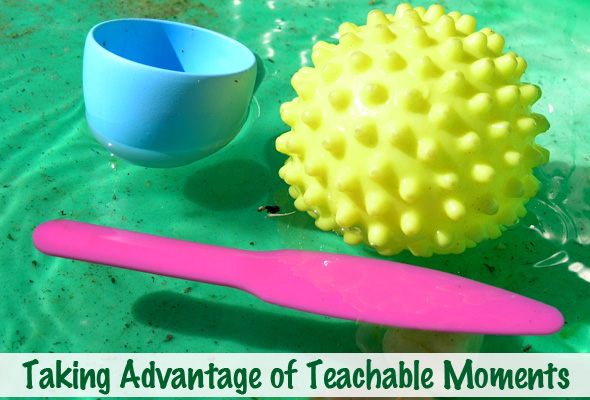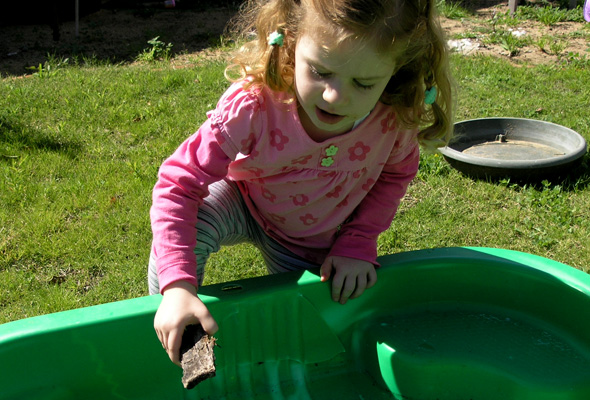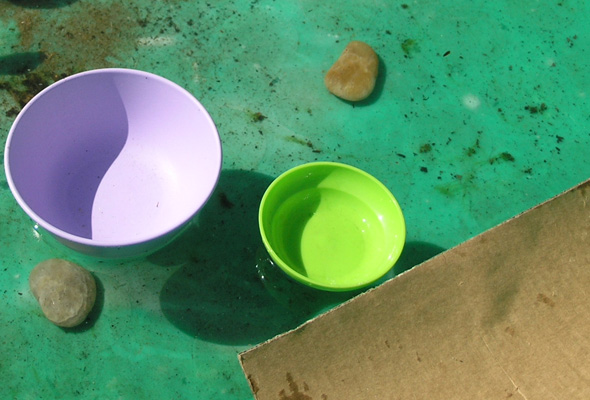Responding to Children’s Spontaneous Experimentation
Recently we headed outdoors to do some gardening and while we were outdoors Immy discovered that her plastic paddling pool had partially filled with rainwater. I was working close by (pulling weeds, urgh!) when she called to me, excitedly telling me how the pebbles she was throwing into the water were all sinking. Taking advantage of her curiosity I decided to capitialise on this teachable moment by asking her if she could find anything in the yard that might float instead of sink? And the hunt was on!
We ended up with all manner of natural (bark, gum nuts, seedpods, flowers, sticks, rocks) and man made (an assortment of plastic toys, a piece of cardboard) objects in the water. The most interesting of which was a plastic ball with holes in it that floated at first but then sunk as it filled with water! Immy had a marvelous time hunting for different objects and testing her theories about which would sink and which would float. Apart from setting the initial challenge, all that was required of me was a little verbal encouragement to help her organise and explain her theories and results (predominantly through questioning), the learning was most definitely child initiated and child led.
How you respond to a child’s experimentation and exploration can influence the learning potential of their investigations. Here are a few ideas for taking advantage of the teachable moment, supporting children’s learning through everyday experimentation;
- Ask good questions: “Why do you think the ball, bowl and knife all float but not the rock?” I have posted previously about asking open ended, thought provoking questions here.
- Point out similar observations in new situations that encourage continuation of the learning and theory forming: “Look at those leaves floating in the puddle. Remember when you were testing what floats and sinks at home? I wonder if we can find anything else in this park that floats?”
- Support their recent interests and explorations by looking for other opportunities for them to experiment: in this instance, collecting objects from around the home for testing at bath time would be one way to achieve this.
- Consider what other resources you have that might support their interest: books, toys, outings, etc.
- Follow the child’s lead and don’t be concerned if they lose interest, it is likely that they will revisit their learning again at some stage. Don’t push.
- Keep it interesting, active and hands on, especially for little kids.
What have your children been experimenting with recently?
Related Posts
- Everyday Learning at Home
- Learning Through Playing & Doing: Laundry Mathematics
- Learning That Happens Everyday




i read ur post…and I am impressed. I was leaving without leaving a comment. i do that all the time. because “i have other things to do..i am in a hurry”. But today i stopped and returned to ur page and i am thinking that this “hurry” in my head many times doesnt let me explore and continue the learning process of my child.
i had same kind of experience with my kid but i just stuck to what floats and what doesn’t.
And the provoking questions u have posted in the othr post are making me feel that “Man! i have never thought like this before. why?” thanks for ur ideas.
My son is experimenting with cotton right now. not the cotton balls we use for removing make up:)))))). but the white one we use for bandages. he touched it and said….”let’ keep it in the refrigrator..”. and “this is so thin…i can roll it….i want to make a book out of it”. i have no idea how to take his experiment further.
Thank you for slowing down to leave a comment 🙂 In the case of the cotton bandages, I would say just follow your son’s lead and take your cues from his suggestions. You could also show him what the bandage is actually for and see if that encourages more questions or suggestions from him 🙂
We decided to get the play dough out for the first time in ages today. It has been in the fridge for months and was freezing! Also quite stiff so while Miss 4 and Miss 2 got stuck in as best they could, I made up a new batch. Fresh from the stove it was lovely and warm and pliable. Miss 2 switched to the new play dough straight away but Miss 4 spent time feeling, experimenting and commenting on the different temperatures and textures (and colour). She enjoyed using both batches and mixing them together. Eventually we had trays full of “biscuits” which after much discussion about safety and checking with mummy first, they proceeded to place in the real oven (not on) to cook. Which got me thinking about making up some craft bread dough which they could really cook and change the temperature and texture again! There’s the next activity!
What a wonderful story of experimentation, Jane, thank you so much for sharing.
Christie, I love that you always give me ideas of new things to point out or talk about with my little A. Thanks!
amazing..